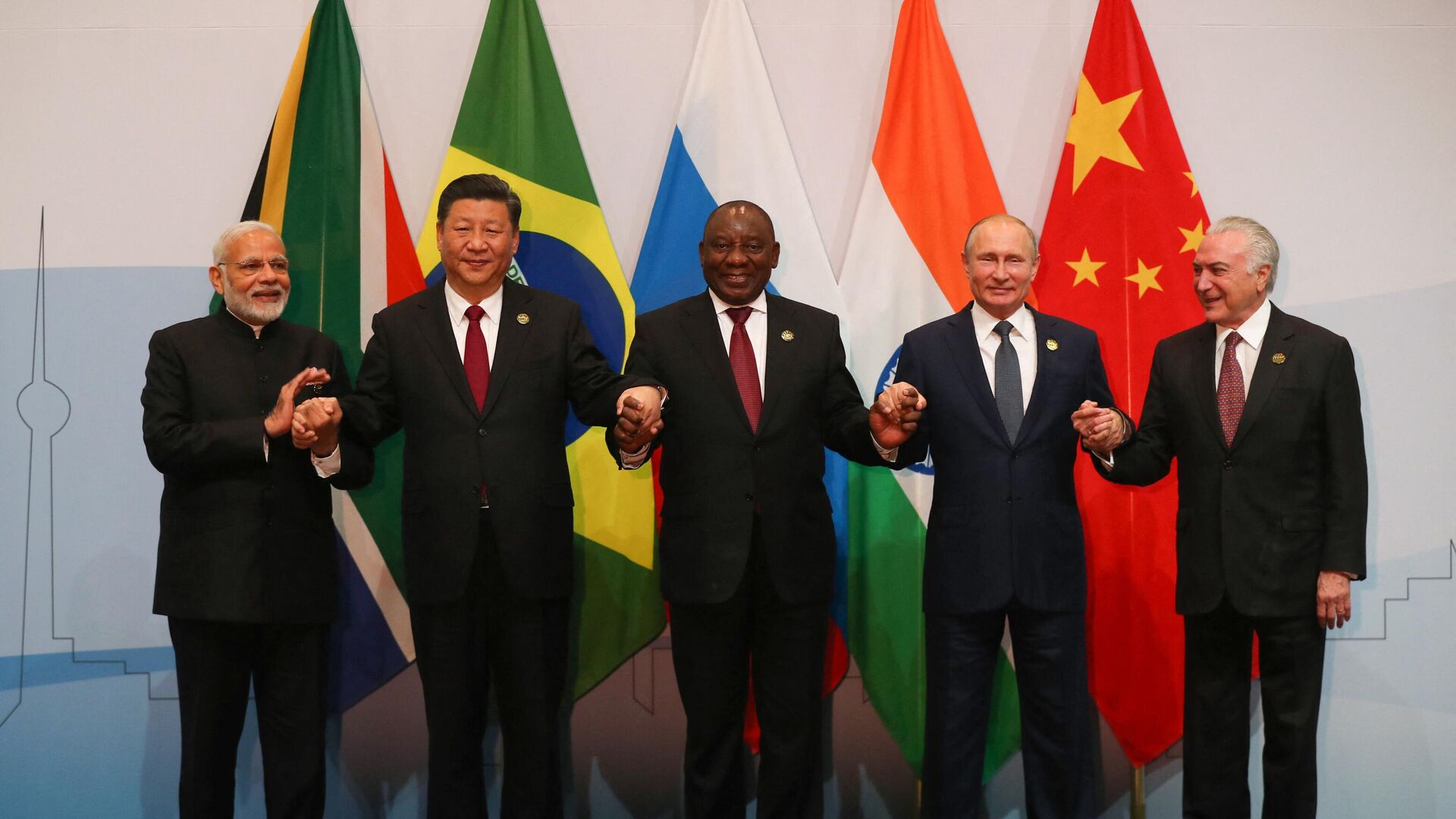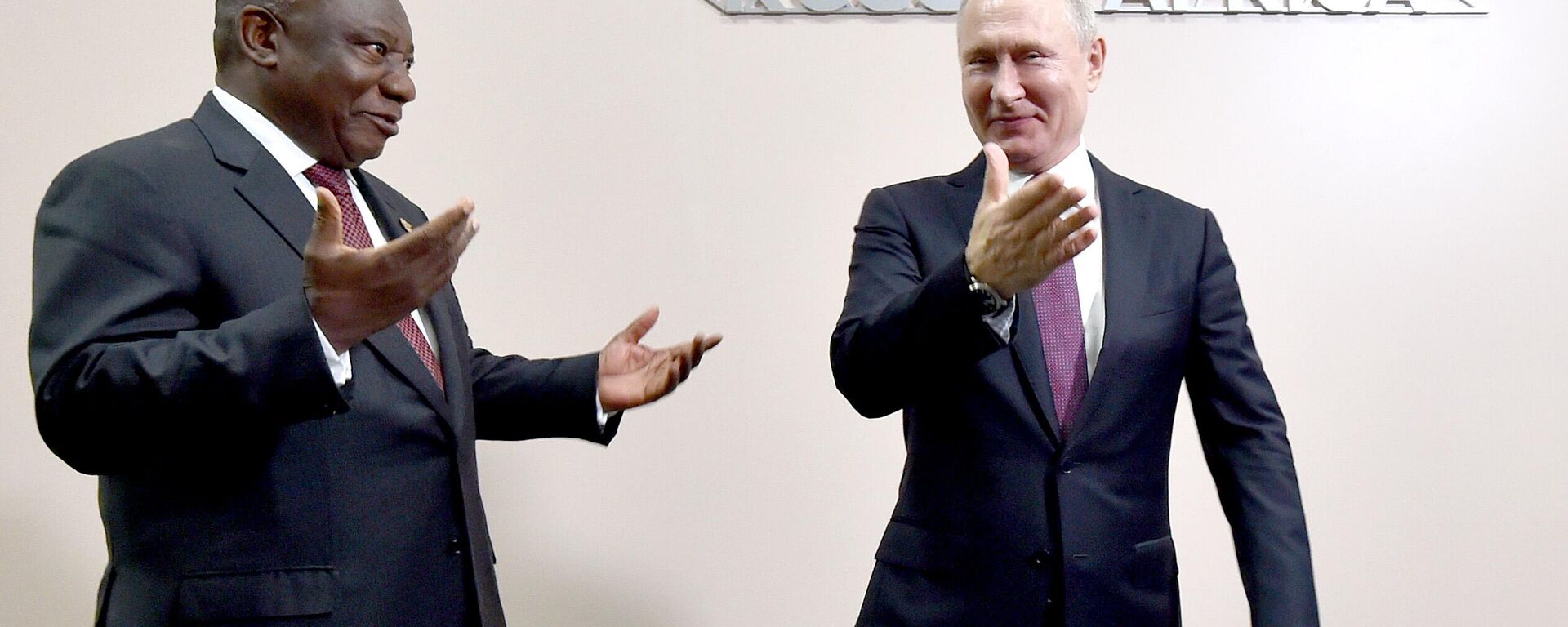https://en.sputniknews.africa/20230503/south-africa-eyes-extending-diplomatic-immunity-to-visiting-heads-of-state-1059007193.html
South Africa Eyes Extending Diplomatic Immunity to Visiting Heads of State
South Africa Eyes Extending Diplomatic Immunity to Visiting Heads of State
Sputnik Africa
South Africa is considering extending diplomatic immunity to visiting heads of state, the country's Minister of Justice and Correctional Services, Ronald Lamola, told Parliament on Tuesday.
2023-05-03T15:33+0200
2023-05-03T15:33+0200
2023-08-03T10:48+0200
sub-saharan africa
southern africa
south africa
russia
international criminal court (icc)
vladimir putin
brics summit
brics
international
https://cdn1.img.sputniknews.africa/img/07e7/04/0e/1058592205_0:0:3110:1750_1920x0_80_0_0_8d65fad37c7e86489b93d0cbf94b97e3.jpg
South Africa is considering extending diplomatic immunity to visiting heads of state, the country's Minister of Justice and Correctional Services, Ronald Lamola, told Parliament on Tuesday in response to a question from members of the Justice and Correctional Services Committee.To explore this possibility, the top official said the South African government would examine how the Rome Statute, which established the International Criminal Court, has been implemented in the country.Lamola also mentioned that other nations, such as Britain and the Netherlands, had domesticated the statute in a way that allowed their executive branches of government to suspend its operation if it went against their national interests.Under Article 98 of the Rome Statute, the ICC may not issue a request for surrender or assistance that would require a requested State to act in violation of its obligations under international law with respect to the immunity of a person or property of a third State, unless the Court can secure the cooperation of the third State to waive the immunity.Lamola's comments come amid ongoing discussions about Russian President Vladimir Putin's invitation to the upcoming BRICS summit, to be hosted by South Africa in August. The ICC issued an arrest warrant for Putin over accusations of the unlawful transfer of children from the combat zone in Ukraine.Moreover, the South African minister also criticized the ICC's lack of consistency in pursuing global justice. In his policy review of his department, Lamola agreed with the notion that the ICC's inconsistency and double standards undermine the work of the court and the rule of law.He cited the example of the ongoing investigation into atrocities in Palestine, which began long before the Ukraine investigation but is still ongoing.Pretoria's membership in the International Criminal Court has become a topic of debate due to Putin's invitation to the BRICS summit. The possibility of Putin attending the event online is also under consideration.Last week, the ruling African National Congress party and President Cyril Ramaphosa sent mixed signals, with Ramaphosa stating that his party believes that South Africa should withdraw from the Rome Statute, which was later deemed an "error" by the office of the presidency.On March 17, the Hague-based ICC issued an arrest warrant for President Putin, as well as Maria Lvova-Belova, Russia's commissioner for children's rights, citing the alleged unlawful transfer of children out of the combat zone in Ukraine. The Kremlin said Russia is not party to the ICC and the court's decision is legally null and void for Moscow.
https://en.sputniknews.africa/20230426/russia-to-clarify-south-africas-position-on-icc-membership-before-brics-summit-kremlin-says-1058865003.html
southern africa
south africa
russia
Sputnik Africa
feedback@sputniknews.com
+74956456601
MIA „Rossiya Segodnya“
2023
Muhammad Nooh Osman
https://cdn1.img.sputniknews.africa/img/07e7/04/0a/1058467512_0:0:1280:1280_100x100_80_0_0_ec723833bcbfcaed2e21952965ad99e4.jpg
Muhammad Nooh Osman
https://cdn1.img.sputniknews.africa/img/07e7/04/0a/1058467512_0:0:1280:1280_100x100_80_0_0_ec723833bcbfcaed2e21952965ad99e4.jpg
News
en_EN
Sputnik Africa
feedback@sputniknews.com
+74956456601
MIA „Rossiya Segodnya“
Sputnik Africa
feedback@sputniknews.com
+74956456601
MIA „Rossiya Segodnya“
Muhammad Nooh Osman
https://cdn1.img.sputniknews.africa/img/07e7/04/0a/1058467512_0:0:1280:1280_100x100_80_0_0_ec723833bcbfcaed2e21952965ad99e4.jpg
south africa, brics, russia, icc, putin, diplomatic immunity, brics summit, putin arrest, putin wanted, ukraine, arresting putin, international criminal court, putin south africa,
south africa, brics, russia, icc, putin, diplomatic immunity, brics summit, putin arrest, putin wanted, ukraine, arresting putin, international criminal court, putin south africa,
South Africa Eyes Extending Diplomatic Immunity to Visiting Heads of State
15:33 03.05.2023 (Updated: 10:48 03.08.2023) Muhammad Nooh Osman
Writer/Editor
The comments follow on the heels of the current controversy regarding Russian President Vladimir Putin being invited to the upcoming summit of the bloc's leaders, to be hosted by South Africa this summer. South Africa is a signatory to the International Criminal Court (ICC), which earlier issued an arrest warrant for Putin.
South Africa is considering extending diplomatic immunity to visiting heads of state, the country's Minister of Justice and Correctional Services, Ronald Lamola, told Parliament on Tuesday in response to a question from members of the Justice and Correctional Services Committee.
To explore this possibility, the top official said the South African government would examine how the Rome Statute, which established the International Criminal Court, has been implemented in the country.
Lamola also mentioned that other nations, such as Britain and the Netherlands, had domesticated the statute in a way that allowed their executive branches of government to suspend its operation if it went against their national interests.
"How we have domesticated it in our country does not give us that kind of space," Lamola told the MPs. "We will explore various options with regard to how the Rome Statute was domesticated in our country, including the option to look at extending customary diplomatic immunity to visiting heads of state in our country."
Under Article 98 of the Rome Statute, the ICC may not issue a request for surrender or assistance that would require a requested State to act in violation of its obligations under international law with respect to the immunity of a person or property of a third State, unless the Court can secure the cooperation of the third State to waive the immunity.
Lamola's comments come amid ongoing discussions about Russian President Vladimir Putin's invitation to the upcoming BRICS summit, to be hosted by South Africa in August. The ICC issued an arrest warrant for Putin over accusations of the unlawful transfer of children from the combat zone in Ukraine.
Moreover, the South African minister also criticized the ICC's lack of consistency in pursuing global justice. In his policy review of his department, Lamola agreed with the notion that the ICC's inconsistency and double standards undermine the work of the court and the rule of law.
He cited the example of the ongoing investigation into atrocities in Palestine, which began long before the Ukraine investigation but is still ongoing.
"The ICC must be equal, it must be fair. The rule of law gets undermined when the law is applied selectively," Lamola stated.
Pretoria's membership in the International Criminal Court has become a topic of debate due to Putin's invitation to the BRICS summit. The possibility of
Putin attending the event online is also under consideration.
Last week, the ruling African National Congress party and President Cyril Ramaphosa sent mixed signals, with Ramaphosa stating that his party believes that
South Africa should withdraw from the Rome Statute, which was later deemed an "error" by the office of the presidency.
On March 17, the Hague-based ICC issued an arrest warrant for President Putin, as well as Maria Lvova-Belova, Russia's commissioner for children's rights, citing the alleged unlawful transfer of children out of the combat zone in Ukraine. The Kremlin said Russia is not party to the ICC and the court's decision is legally null and void for Moscow.



